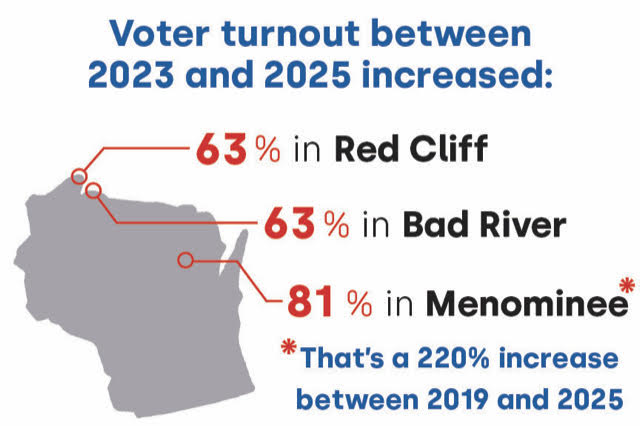
- Details
- By Neely Bardwell
Native Vote. In the Wisconsin Supreme Court election held on April 1 that resulted in Dane County Judge Susan Crawford winning and preserving the court’s left leaning majority, Native Americans in the state set records for voter turnout.
According to the Wisconsin Conservation Voters, a non-partisan voter advocacy orgranization, voter turnout between 2023 and the 2025 Supreme Court Election increased 63 percent in Red Cliff, 63 percent in Bad River, and 81 percent in Menominee. For the Menominee Nation, that is a 220 percent increase between 2019 and 2025.
Maria Haskins (Anishinaabe, Lac Courte Oreilles, Stockbridge, and Oneida), the Wisconsin Native Vote Regional Tribal Organizer for Wisconsin Conservation Voters, told Native News Online that after the 2024 presidential election, voters were tired and apathetic.
“Here's what we know; we know that the primaries for the Wisconsin spring elections are very very low voter turnout, and we also know that races like the Supreme Court are typically like lower voter turnout anyway,” explained Haskins. “We were able to partner with the Native American Rights Fund and have different community dinners. All dinners were very well attended. All had very good feedback.”
The community dinners were held in areas where the Native population is the highest like Milwaukee, Bad River, and Menominee. They held the dinners to educate, register, and empower Native voters.
The dinners weren't the only efforts to get out the vote for the Supreme Court Election, Haskins explains they also held text banking, sent mail pieces, and attended local community events to register eligible voters.
“Looking into numbers after the election and seeing that huge increase in turnout, it really just gives you hope and motivation to keep going,” explained Haskins when asked about how it felt to see their hard work come to fruition. “We're just a small piece of this work. We're not the only organization out there encouraging people to get out there and vote.”
The Menominee voting area saw the biggest voter turnout with some Menominee citizens running for local seats.
“I'm also really grateful for people in the Menominee community who ran for office. I truly feel like all of those people who ran for those empty seats, that's what also got people to the polls,” said Haskins. “I think that's really remarkable. Menominee really showed how a community can come together.”
More Stories Like This
Native News Weekly (August 25, 2024): D.C. BriefsUS Presidents in Their Own Words Concerning American Indians
Indian Gaming Association Honors the Life and Legacy of U.S. Senator Ben Nighthorse Campbell
Hoopa Tribe, BIA Contribute $20K Reward in Cold Case for Native Woman Missing for Over Three Decades
Colorado Governor Orders Flags Lowered to Half Staff to Honor Former Sen., Ben Nighthorse Campbell
Help us defend tribal sovereignty.
At Native News Online, our mission is rooted in telling the stories that strengthen sovereignty and uplift Indigenous voices — not just at year’s end, but every single day.
Because of your generosity last year, we were able to keep our reporters on the ground in tribal communities, at national gatherings and in the halls of Congress — covering the issues that matter most to Indian Country: sovereignty, culture, education, health and economic opportunity.
That support sustained us through a tough year in 2025. Now, as we look to the year ahead, we need your help right now to ensure warrior journalism remains strong — reporting that defends tribal sovereignty, amplifies Native truth, and holds power accountable.
 The stakes couldn't be higher. Your support keeps Native voices heard, Native stories told and Native sovereignty defended.
The stakes couldn't be higher. Your support keeps Native voices heard, Native stories told and Native sovereignty defended.
Stand with Warrior Journalism today.
Levi Rickert (Potawatomi), Editor & Publisher


